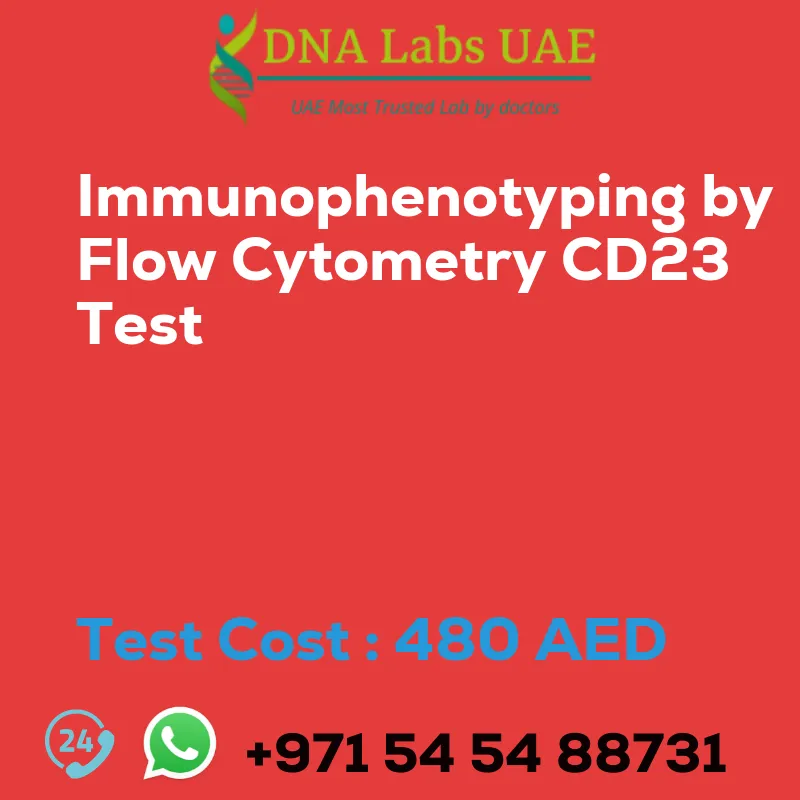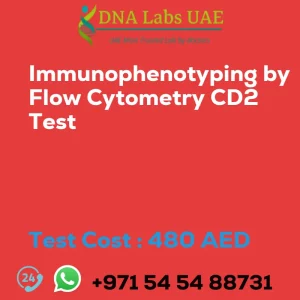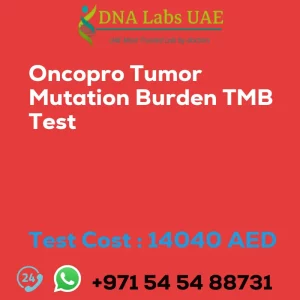IMMUNOPHENOTYPING BY FLOW CYTOMETRY CD23 Test
Cost: AED 480.0
Test Details:
The CD23 test is a type of immunophenotyping test performed using flow cytometry. CD23 is a cell surface protein that is primarily expressed on B-cells and some epithelial cells. This test is used to identify and quantify the presence of CD23 on cells.
Method:
Flow Cytometry
Test Type:
Cancer
Doctor:
Oncologist, Hematologist
Test Department:
FLOW CYTOMETRY
Pre Test Information:
Give brief clinical history.
Sample Condition:
3 mL (2 mL min.) whole blood in 1 Lavender Top (EDTA) tube
3 mL (2 mL min.) whole blood in 1 Green Top (Sodium Heparin) tube OR 2 mL (1 mL min.) Bone marrow in 1 Green Top (Sodium heparin) tube
Ship immediately at 18-22°C. DO NOT REFRIGERATE OR FREEZE. Specify time, date, and clinical details on the test request form.
Report Delivery:
Sample Daily by 9 am; Report Same day
Test Components:
Price: AED 480.0
Method:
Flow Cytometry
Test Type:
Cancer
Doctor:
Oncologist, Hematologist
Test Department:
FLOW CYTOMETRY
Pre Test Information:
Give brief clinical history.
Test Details:
The CD23 test is a type of immunophenotyping test performed using flow cytometry. CD23 is a cell surface protein that is primarily expressed on B-cells and some epithelial cells. This test is used to identify and quantify the presence of CD23 on cells. Flow cytometry is a technique that allows for the simultaneous analysis of multiple characteristics of individual cells. In the CD23 test, cells are labeled with fluorescently tagged antibodies specific to CD23. The cells are then passed through a flow cytometer, which detects and measures the fluorescence emitted by each cell. By analyzing the fluorescence intensity of the labeled cells, flow cytometry can determine the percentage of cells expressing CD23 and the level of CD23 expression on those cells. This information can be used to assess the immune status of an individual, diagnose certain diseases, and monitor disease progression or response to treatment. The CD23 test is commonly used in the diagnosis and monitoring of B-cell lymphomas, such as chronic lymphocytic leukemia (CLL) and follicular lymphoma. It can also be used to distinguish between different types of B-cell lymphomas and to assess the prognosis of certain cancers. Overall, the CD23 test is a valuable tool in immunophenotyping, providing important information about the presence and expression of CD23 on cells, which can aid in the diagnosis and management of various diseases.
| Test Name | IMMUNOPHENOTYPING BY FLOW CYTOMETRY CD23 Test |
|---|---|
| Components | |
| Price | 480.0 AED |
| Sample Condition | 3 mL (2 mL min.) whole blood in 1 Lavender Top (EDTA) tubeAND 3 mL (2 mL min.) whole blood in 1 Green Top (Sodium Heparin) tube OR 2 mL (1 mL min.)Bone marrow in 1 Green Top (Sodium heparin) tube. Ship immediately at 18\u0192??22?\u00f8C. DO NOT REFRIGERATE OR FREEZE. Specify time, date and clinical details on test request form. |
| Report Delivery | Sample Daily by 9 am; Report Same day |
| Method | Flow Cytometry |
| Test type | Cancer |
| Doctor | Oncologist, Hematologist |
| Test Department: | FLOW CYTOMETRY |
| Pre Test Information | Give brief clinical history. |
| Test Details |
The CD23 test is a type of immunophenotyping test performed using flow cytometry. CD23 is a cell surface protein that is primarily expressed on B-cells and some epithelial cells. This test is used to identify and quantify the presence of CD23 on cells. Flow cytometry is a technique that allows for the simultaneous analysis of multiple characteristics of individual cells. In the CD23 test, cells are labeled with fluorescently tagged antibodies specific to CD23. The cells are then passed through a flow cytometer, which detects and measures the fluorescence emitted by each cell. By analyzing the fluorescence intensity of the labeled cells, flow cytometry can determine the percentage of cells expressing CD23 and the level of CD23 expression on those cells. This information can be used to assess the immune status of an individual, diagnose certain diseases, and monitor disease progression or response to treatment. The CD23 test is commonly used in the diagnosis and monitoring of B-cell lymphomas, such as chronic lymphocytic leukemia (CLL) and follicular lymphoma. It can also be used to distinguish between different types of B-cell lymphomas and to assess the prognosis of certain cancers. Overall, the CD23 test is a valuable tool in immunophenotyping, providing important information about the presence and expression of CD23 on cells, which can aid in the diagnosis and management of various diseases. |








